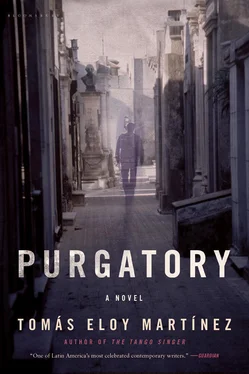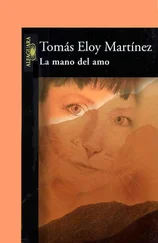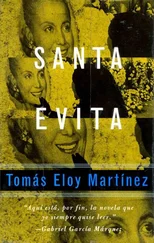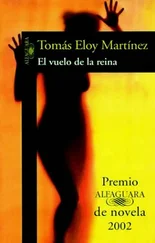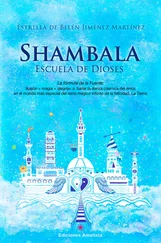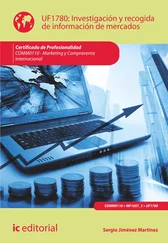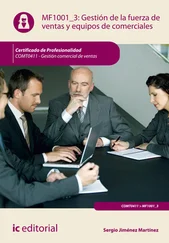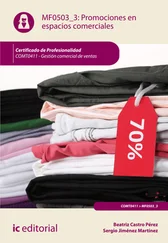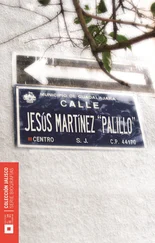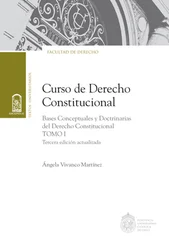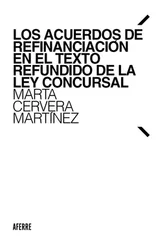Tomás Eloy Martínez - Purgatory
Здесь есть возможность читать онлайн «Tomás Eloy Martínez - Purgatory» весь текст электронной книги совершенно бесплатно (целиком полную версию без сокращений). В некоторых случаях можно слушать аудио, скачать через торрент в формате fb2 и присутствует краткое содержание. Год выпуска: 2008, Издательство: Publishing PLC, Жанр: Современная проза, на английском языке. Описание произведения, (предисловие) а так же отзывы посетителей доступны на портале библиотеки ЛибКат.
- Название:Purgatory
- Автор:
- Издательство:Publishing PLC
- Жанр:
- Год:2008
- ISBN:нет данных
- Рейтинг книги:5 / 5. Голосов: 1
-
Избранное:Добавить в избранное
- Отзывы:
-
Ваша оценка:
- 100
- 1
- 2
- 3
- 4
- 5
Purgatory: краткое содержание, описание и аннотация
Предлагаем к чтению аннотацию, описание, краткое содержание или предисловие (зависит от того, что написал сам автор книги «Purgatory»). Если вы не нашли необходимую информацию о книге — напишите в комментариях, мы постараемся отыскать её.
"Purgatory" narrates the anxiety of the love lost and then found in a magnificent reconstruction of the sinister events that went down in the time of the regime in Argentina.
Purgatory — читать онлайн бесплатно полную книгу (весь текст) целиком
Ниже представлен текст книги, разбитый по страницам. Система сохранения места последней прочитанной страницы, позволяет с удобством читать онлайн бесплатно книгу «Purgatory», без необходимости каждый раз заново искать на чём Вы остановились. Поставьте закладку, и сможете в любой момент перейти на страницу, на которой закончили чтение.
Интервал:
Закладка:
‘Sure, go ahead.’
‘After the Malvinas War, the dictatorship collapsed. By then, Chela was living in Texas with her husband and I didn’t want to leave my mother all alone in Buenos Aires. The air was thick with old grudges demanding retribution. My father had been one of the junta’s most visible collaborators — though he had also been one of the first to sing the praises of democracy — and he was probably afraid that I would mention Simón.’
‘Nobody could have blamed you. Your husband was one of the disappeared. You were a victim.’
‘Nobody did blame me. I blamed myself for having been stupid and gullible, for having been a collaborator, in my own way. My conscience wouldn’t leave me alone. My father wouldn’t leave me alone. He would come and stand by my bedside, stroke my shoulder, my hair. He’d never been demonstrative but now suddenly, whenever we were alone, he was overly affectionate. In the end all I felt for him was disgust, pity and disgust. There was nothing left for me in Rio and I missed my mother. I wanted to go back to Buenos Aires to take care of her. I checked the bus timetables — back then it was a twenty-hour trip — and decided to leave as soon as possible when suddenly I got a phone call from Caracas. Some woman I didn’t know asked if I was related to Simón Cardoso. I’m his wife, I told her. “I’m Nurse Coromoto at the Centro Médico La Trinidad,” she said. “Your husband was brought into the emergency department two hours ago suffering from paroxysmal atrial fibrillation. We’ve already given him IV digoxin.” “I don’t understand a word you’re saying,” I interrupted her. “You don’t understand? Simón Cardoso is suffering from serious cardiac arrhythmia. He needs intensive care but claims that he has no money. If no one is prepared to cover the cost of his treatment, we’ll have to send him to a public hospital where he’ll be lucky to be treated at all.” The nurse’s voice was clipped, harsh, urgent. I begged her to admit Simón for forty-eight hours. I would leave immediately, I told her, and I would pay for everything. I’d never even been to Caracas. And I had no money left and was not about to call my father.’
‘You must have been desperate.’
‘I was, and I couldn’t think about anything except how to get there. By the time I hung up, I was crying. It had been seven years since Huacra and the empty hours and days were finally beginning to be filled, to have a purpose, a direction. I went to Galeão airport at five in the morning and asked at every counter for the quickest flight to Caracas. I found a flight leaving Rio at eleven and connecting in Bogotá and bought a ticket with a credit card I’d never used before and didn’t know how I would pay off. As soon as the banks opened, I went to withdraw the last three hundred dollars I had in my account. I was told I had a balance of five thousand dollars. My father, again. Sooner or later I would have to pay the money back, but at that point I didn’t care how.’
‘So your father knew where you were?’
‘No. He’d been putting money in my account for months, though I never asked him for anything. He just did it, like he always did. To him, I was just something that bought and spent. Caracas unsettled me. I felt strange, as though I’d just arrived in Luanda or Nauru. The city centre was teeming with hawkers and office workers speaking some sort of onomatopoeic language in which I could only make out scraps of Spanish. In travel agencies and cafes and countless discount shops I asked for directions to the Centro Médico and every time I was sent off in a different direction, to some remote area: Antímano, Boleíta, El Silencio, Propatria. I had so much trouble finding the place I began to wonder if it really existed. I mentioned La Trinidad to an assistant in a clothes shop and she said that she thought there was a big clinic out there that dealt with infectious diseases. I decided to take a chance. I hailed a cab and the driver refused to take me, as did the next four or five taxis. They said that it was too far, that they’d have to drive out through the dark hills. When I finally did manage to persuade a driver, I realised how dangerous it was. La Trinidad is about fifteen kilometres from the Plaza Bolívar, at the end of a tangle of winding streets perched on a cliff overlooking a ravine. The taxi’s engine coughed and sputtered, but it kept going. By the time we arrived it was almost midnight. The duty nurse took pity on me; she checked the computer for patients recently admitted or discharged. No one named Simón Cardoso appeared on the list and she went back several years.’
‘It was a hoax. Like Rio.’
‘I didn’t think so at the time. At the time I didn’t even realise that Rio had been a set-up. I hadn’t had anything to eat for hours and I fainted. When I came round, I asked for Nurse Coromoto. The only person by that name who worked at the clinic was in the accounts department. I assumed I’d come to the wrong hospital. It was the logical explanation. Why would anyone go to the trouble of phoning me from Caracas in the middle of the night to tell me the one lie that could persuade me to leave Rio. What difference did it make whether I was in Brazil or Venezuela?’
‘Your father again. Do you know why he was doing it?’
‘No. Maybe to torment me, to keep me away. He didn’t trust me.’
Sitting in Toscana listening to Emilia it seemed to me she was three distinct women, first, the woman who was gravely telling me about her tragic past, dwarfed by her father’s looming shadow but determined not to be cowed, not to allow this dark force to destroy her will to survive. Next, the woman who wore white-and-purple-patterned false nails that made her slender fingers look unspeakably vulgar. And a third, who complemented the other two — the first perhaps more than the second — an intelligent woman who would recite the poems of Gonzalo Rojas and John Ashbery, who recited Marianne Moore’s zoological creatures drawing out the words until they became disconnected from reality, until they were no more than words: we do not admire what we cannot understand: the bat. a tireless wolf under a tree .
‘It’s easy to get lost in Caracas,’ I said to her. ‘When I lived there, there were lots of clinics and neighbourhoods called Trinidad: Lomas de la Trinidad, Hacienda de la Trinidad, Trinidad Santísima.’
‘I found that out in the weeks that followed. I rented a cheap apartment in Chacaíto, the only part of the city with sidewalks and cafes. Every morning at seven o’clock I’d set off on my tour of hospitals and clinics looking for Simón. I didn’t always manage to get help. It was just before Christmas and people were in no mood to hear about other people’s misfortunes. I told my story to the nurses and the doctors, but they barely listened. Thousands of Argentinians had come to Caracas before me, all telling the same story. After a few weeks it occurred to me to print flyers with Simón’s photo and stick them up in the kiosks around Sabana Grande in case someone recognised him. The few people who got in touch wanted me to give them money, wanted me to come alone. They were con artists pure and simple. I was taken in by some of them and frittered away the last of my savings.’
‘You could have got a job. It was possible to get work back then.’
‘I did, I applied to be a cartographer with the Venezuelan Oil Company and they gave me the curious job of naming the intricate network of roads carved into the hills around the city like an amphitheatre. I spent my mornings walking up endless flights of steps, losing myself in the winding lanes that led to barns or sawmills, to storehouses of cardboard, carefully noting down the nicknames given them by locals, mostly names related to local characters: Iván el Cobero, Paloma Mojada, Coño Verde, La Cangrejera, things like that. What had been a series of dotted lines, an undocumented circulatory system, I drew together with a skein of words. I divided my time between this hare-brained task and my trips to the hospitals. I could feel Simón slipping through my fingers, but at night, as soon as I fell asleep, he appeared in my dreams. I was reading a lot of Swedenborg at the time, and took to heart his idea that human beings are merely “cyphers”, a vestige of the writings of God which allows us to be other, to be elsewhere, if God should decide that what He has written means something different. More than once I went to the Cinemateca de Caracas to see Hitchcock’s Vertigo , with Kim Novak as a ghost so carnal that you accept her death precisely because it is an oxymoron. But the true corpse in the movie is obviously James Stewart, a man who loses the woman he loves not once but twice. I couldn’t bear to be Stewart, I couldn’t bear to lose Simón a second time. I would have been better off forgetting, but I realised that I would never be able to forget. I had grown used to being alone, to fending for myself, to ignoring the sexual innuendos of the men of Caracas who didn’t seem to know the meaning of the word “no”. Like I said, I lived only to find him.
Читать дальшеИнтервал:
Закладка:
Похожие книги на «Purgatory»
Представляем Вашему вниманию похожие книги на «Purgatory» списком для выбора. Мы отобрали схожую по названию и смыслу литературу в надежде предоставить читателям больше вариантов отыскать новые, интересные, ещё непрочитанные произведения.
Обсуждение, отзывы о книге «Purgatory» и просто собственные мнения читателей. Оставьте ваши комментарии, напишите, что Вы думаете о произведении, его смысле или главных героях. Укажите что конкретно понравилось, а что нет, и почему Вы так считаете.
